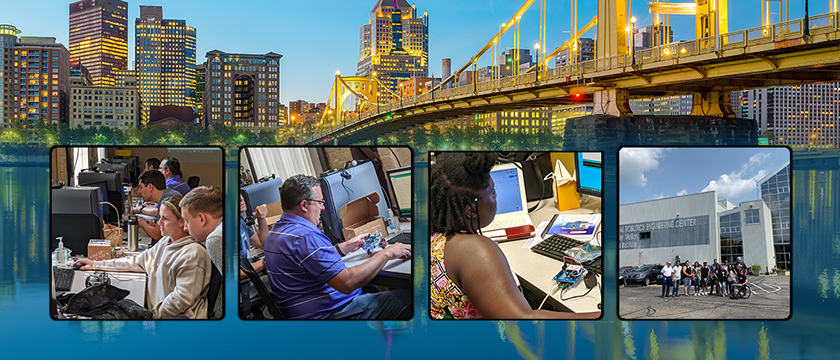Robotics Academy Certified Training for the Arduino (Parallax Shieldbot, Onsite)
In this 5-day face-to-face teacher training, you will work with the world leaders in robotics education to learn how to teach using the Arduino with the Parallax Shieldbot. Tuition includes a free Shieldbot from Parallax and access to CS2N and Carnegie Mellon Robotics Academy Training Materials.
| Register with Credit Card > | Register with Purchase Order > |
This training course is designed for educators who wish to teach robotics and STEM concepts using the Arduino microcontroller. The course offers a range of benefits, including hands-on learning with practical and problem-solving exercises that align with robotics technicians' knowledge, skills, and attitudes. This course is endorsed by the ARM (Advanced Robotics for Manufacutring) Institute, and allows certified educators to offer SMART Robotics Technician Certifications to their students.
The course is particularly well-suited for teachers and coaches who are new to programming, robotics, and embedded systems and wish to learn these fundamentals as well as the pedagogy associated with STEM concepts. Experienced teachers with programming and robotics backgrounds will also benefit from the course, especially with its focus on the Arduino microcontroller, hands-on practice in troubleshooting student errors, and integration of STEM concepts.
Educators will learn how to leverage our research-based curricula including Robotics Integration with Shieldbot (Arduino), as well as Software Foundations with Shieldbot (Arduino) in their own classrooms. Upon completion of the training, participants will receive a certificate of completion stating 36 professional development hours in areas including robotics and coding.
Supporting Makerspaces
The course offers significant value to makerspaces looking to expand their offerings. By incorporating the course, makerspaces can provide their members with the opportunity to learn about robotics and STEM concepts in a hands-on, interactive environment. Educators who complete the course can then serve as valuable resources within the makerspace, helping to develop and lead robotics and STEM-related workshops, classes, and projects.
By taking this course, educators can customize their learning to suit their own teaching style and goals. Additionally, they will have the opportunity to connect and network with other educators in the field of robotics and STEM education, share ideas and best practices, and build a supportive community. Ultimately, the course empowers educators to effectively teach robotics and STEM concepts, helping their students develop critical thinking, problem-solving, and teamwork skills that are essential for success in the 21st-century workforce. By taking this course, educators can make a difference in the lives of their students and prepare them for a bright future.
![]() Computer Science Teachers Association (CSTA) Standards (Accredited 2025-2027)
Computer Science Teachers Association (CSTA) Standards (Accredited 2025-2027)


Syllabus
Session 1: Technology Testbed
-
Introduction to the Arduino platform
-
Overview of the Arduino software environment
-
Creating and testing simple Arduino sketches
-
Introduction to the ShieldBot and Parallax Board of Education Shield
- Overview of HuskyLens Camera
Session 2: ShieldBot & Open-Loop Navigation
-
Following assembly diagrams for hardware setup
-
Identifying and understanding ShieldBot subsystems
-
Programming open-loop (timed) movements
-
Modifying and customizing existing programs
-
Adjusting mechanisms for improved motion control
Session 3: Sensors and Signals
-
Basics of electricity and electronic signaling
-
Constructing circuits on a breadboard
-
Distinguishing digital vs. analog inputs
-
Understanding and using whisker switches
-
Exploring electricity, conductivity, and sensor feedback
-
Introduction to phototransistors and light frequency
-
Detecting and resolving sensor interference
-
Navigating with multiple sensor inputs
Session 4: Camera Perception and Color-Based Detection
-
Integrating vision and motion subsystems (robot integration)
-
Understanding Arduino and HuskyLens communication protocols
-
Training HuskyLens for color recognition
-
Adjusting block size and detection thresholds
-
Exploring how vision systems interpret visual data
-
Making decisions based on camera-detected inputs
Session 5: Advanced Camera Programming and AprilTag Recognition
-
Detecting specific objects
-
Introduction to AprilTags: visual markers for robotics
-
Understanding tag design and unique identification features
-
Detecting AprilTags with the HuskyLens
-
AI extension activities with the HuskyLens
All participants will be provided with a FREE take-home Parallax Shieldbot.
Robot Shield with Arduino
https://www.parallax.com/product/32335
Tuition Cost - $1,299
Tuition includes 5 days of onsite training and use of Robotic Academy’s computers, robot kits, curriculum, and programming software during the week. You do not need to purchase any hardware or software for this course. Lunch is provided as part of tuition Monday through Thursday.
Upon Completion
- 36 ACT 48 credits for Pennsylvania teachers
- Opportunity to earn a Carnegie Mellon Robotics Academy Certification stating 36 hours of professional development
- A Certificate of Completion that may also be used to apply for Continuing Education hours
Policies
1. Eligibility
-
Courses are open to individuals 18 years of age or older who are educators, coaches, or professionals.
-
International enrollment is subject to applicable U.S. export control laws and may be restricted where prohibited.
-
CMRA reserves the right to verify eligibility and decline enrollment or remove participants who provide false information or violate these policies.
2. Registration & Payment
-
Each registration is valid for one participant only.
-
Course materials, recordings, and login credentials are non-transferable. Other educators from the same school or organization must register separately to gain access.
-
Registrants must provide accurate, current information during registration.
-
Payment may be made via credit card or institutional purchase order. Contact cmra@nrec.ri.cmu.edu for purchase order arrangements.
-
Payments processed through the CMRA online store are subject to a 3% credit card processing fee, deducted from any applicable refund.
3. Refund Policy
-
Refund requests must be submitted in writing via email to cmra@nrec.ri.cmu.edu .
-
Requests made at least 14 calendar days prior to the class start date will receive a refund, minus the 3% processing fee.
-
No refunds will be issued once:
-
A class is full, or
-
The request is made within 14 calendar days of the class start date.
-
4. Course Cancellation or Changes
-
CMRA reserves the right to cancel or reschedule courses due to low enrollment, instructor availability, or other unforeseen circumstances.
-
If a course is canceled, registrants will be offered:
-
A full refund (minus applicable processing fees), or
-
The option to transfer to a future session. Participants who choose to transfer to a future session waive their right to request a refund for that registration.
-
-
Instructors, schedules, and course content are subject to change.
5. Health Policy for In-Person Trainings
-
Participants should not attend onsite training if they are sick or experiencing symptoms of a contagious illness.
-
CMRA will make every effort to provide:
-
Substitute online access to training materials, or
-
Placement in a future training cohort (if available) at no additional cost, provided advance notice is given where possible.
-
6. Technology Requirements (Online Courses)
-
Participants are responsible for having:
-
A reliable computer and stable internet connection,
-
A modern web browser, and
-
Any required hardware and software specified in the course description.
-
-
Internet access and bandwidth costs are the responsibility of the participant. CMRA is not liable for disruptions caused by a participant’s technical limitations or network issues.
7. Course Materials & Copyright
-
All course materials are the intellectual property of CMRA. Unauthorized sharing, duplication, or redistribution of course materials is prohibited.
-
Materials are provided for personal, non-commercial use only by the registered participant.
-
Printing or downloading materials is allowed solely for participation in the course or for approved instructional use as outlined by CMRA.
-
Recordings and course presentations are hosted for up to one year after course completion. Participants are responsible for downloading any materials they wish to keep long-term.
8. Code of Conduct
-
Participants must treat instructors and peers with professionalism and respect.
-
Harassment, discriminatory behavior, or academic dishonesty will result in immediate removal from the course without refund.
-
Unauthorized access or distribution of course materials is grounds for removal and potential denial of future registration.
9. Accessibility and Accommodations
-
CMRA is committed to providing inclusive learning opportunities.
-
Requests for accommodations must be submitted in writing to cmra@nrec.ri.cmu.edu at least one month before the course begins.
-
Services may be modified or withdrawn if participants fail to engage or participate as required for delivery of accommodations.
10. Privacy and Data Use
-
Personal information (such as name, mailing address, or email) provided during registration is used only to administer courses, respond to inquiries, and provide CMRA updates.
-
In online chat areas, participants should be aware that their username or email may be visible to others.
-
CMRA will not share personal data with third parties except as required by law or legal process.
11. Coursework Use
-
CMRA may use coursework produced by students to advance its educational mission or for research purposes.
-
When this occurs, participants will be given the option to have their name credited to the material.
12. Certification and Completion
-
Certificates are awarded upon successful completion of all course requirements, including:
-
Completion of all required assignments to the satisfaction of the instructor, and
-
Passing the certification exam, where applicable.
-
-
Certificates are issued digitally and are not equivalent to CMU academic credit, unless explicitly stated.
13. Indemnification
-
Participants agree to indemnify and hold CMRA harmless from any claims, liabilities, damages, or expenses arising from their participation in the course, including infringement of third-party rights.
14. Limitation of Liability
-
All services and materials are provided “as is.”
-
CMRA is not liable for indirect, incidental, or consequential damages related to course participation.
15. Policy Revisions
-
Policies are subject to change.
-
The most current version will always be made available on the CMRA registration site or learning platform.
Contact
For questions or clarification, please email cmra@nrec.ri.cmu.edu.


